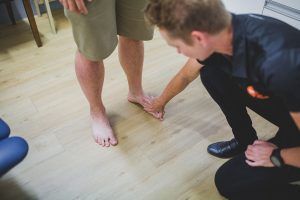How can Podiatry assist Diabetes?
Diabetes is a chronic health disease that can cause complications in the feet and lower limbs. All persons diagnosed with Diabetes should see a Podiatrist at least once per year to have their foot health checked. A Podiatrist will conduct a thorough assessment of the vascular (blood supply), neurological (nerve supply), joint health, skin health and biomechanical (forces that go through the feet) health of your feet and determine the current foot health risk status.
A low risk foot health status would indicate having annual foot health checks to monitor the foot health risk; a moderate risk foot health status would indicate having a foot health check every 6 months and a high risk foot health status may indicate that monthly checks and treatment are required.
How does Diabetes affect the Foot?
Diabetes can affect the small blood vessels and small nerves in the body. Our feet have a large proportion of those small blood vessels and nerves and therefore are more at risk of being compromised. All of the cells in our body require blood and nerve supply to survive – our skin, hair, nails, muscles, ligaments, tendons all require an adequate supply of blood to receive the nutrients necessary to allow normal function. If those tissues are not receiving enough blood and adequate nutrients, they start to fail in their normal protective functions. One of the signs that there is insufficient blood supply reaching the feet can be changes in skin texture, a loss of hair from the skin and a change in nails. Additionally, if the skin is damaged it may take longer than usual to heal and become more prone to infection. The body fights infection by relying heavily on adequate blood supply, so if an infection is present (Diabetics are more prone to infections as well), this can result in chronic ulceration of the tissue which may lead to amputation of the limb near the infected area.
What are warning signs I should look for?
Signs that the nerve supply to the feet have been affected include burning sensations on the soles of the feet, especially of a night time, pins and needles, areas of numbness or unusual sensations in the feet and lower legs. Our nerves allow us to feel pain, pain tells us that there is something wrong and informs us to “do something” about it. If we are unable to feel pain (due to the nerves not working properly), we might be unaware that a problem exists and it remains un-checked. A simple example of this is that when our nerve supply works properly, we very quickly become aware when a shoe is rubbing causing a blister, or if a foreign object is in our shoe we remove the shoe and the foreign object. If peripheral neuropathy is present (damage to the nerves that supply the extremities of the legs and feet) it is possible to walk in those same shoes for days and be unaware that the blistering is occurring. Pain is a very important sensation, without it, we remain in the dark about damage that is occurring.
What will a Podiatrist do?
A Podiatrist will assess the blood supply and nerve supply to the feet and provide advice on the signs and symptoms to be aware of if either of these become compromised. A Podiatrist will also conduct an assessment of the pressures that go through the feet and provide advice on areas of the feet that may be at risk for abnormally large pressures that could result in damage to the feet. Appropriate footwear is also important for high risk foot types as a poorly fitting shoe can cause damage to the feet. Areas of thickened skin on the feet also indicate that high pressure is being absorbed at those locations. The skin attempts to protect itself by producing more layers of skin resulting in callouses or corns. These areas of thickened skin can become painful and increase the risk of developing into ulcerations.
In summary, a regular visit to the Podiatrist is essential for all persons who are diagnosed with Diabetes. It is the role of a Podiatrist to assist in the prevention of foot ulcerations that may lead to lower limb amputation that can result from diabetes. Understanding your foot health is critical to preventing complications associated with diabetes.
Visit our Health Professionals Today – Reserve your appointment online or by calling 1300 876 348



